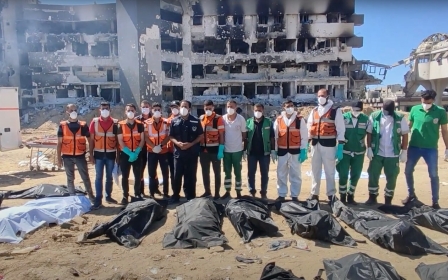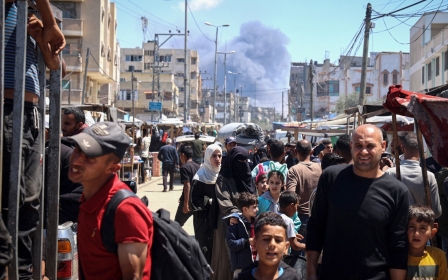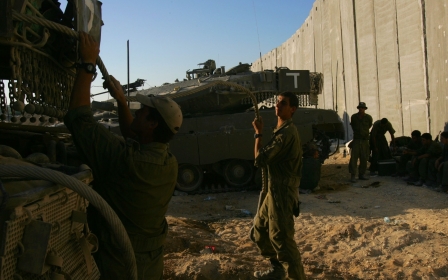US pause on Israel weapons shipment should have happened 'months ago', say rights advocates

The Biden administration's announcement that it has halted a shipment of thousand-pound bombs to Israel was met with little fanfare from rights advocates and government watchdog groups, who said it is likely "too late" for a change in US policy to undo the damage to Palestinian life spurred by Israel's war on Gaza.
Rights advocates said the shipment pause also falls short of what the Biden administration's policy and US law require in terms of weapons transfers, given the Israeli violations of international law using American weapons in the Gaza war, which has been documented by rights groups.
'This needs to be the start of a sea-change in American policy towards the provision of security assistance to Israel'
- Josh Paul, former State Department official
The news of the pause in shipments, first reported by Axios on Monday with few details of what arms would be halted, was later reported by several American news outlets which noted the transfer consisted of 1,800 2,000-pound bombs and 1,700 500-pound bombs.
During a congressional hearing on Wednesday, US Secretary of Defence Lloyd Austin linked the paused shipment to Washington's concerns about an Israeli invasion of Rafah.
“We’ve been very clear...from the very beginning, that Israel shouldn’t launch a major attack into Rafah without accounting for and protecting the civilians that are in that battlespace." "And again, as we have assessed the situation, we have paused one shipment of high payload munitions," he told a Senate hearing.
Stay informed with MEE's newsletters
Sign up to get the latest alerts, insights and analysis, starting with Turkey Unpacked
Austin added that the US has "not made a final determination on how to proceed with that shipment".
On Wednesday, US State Department spokesperson Matthew Miller said they are reviewing further arms packages to Israel over concerns with the Rafah offensive.
The US move comes on the heels of two major developments in Gaza this week. The first was Hamas's announcement that it had accepted a Qatari-Egyptian ceasefire proposal, negotiated with CIA director William Burns.
The announcement caught everyone off guard, leading the Israelis to accuse the Americans of failing to brief them before the announcement - a charge the US denied.
Then, within hours of the announcement, Israel began carrying out air strikes on Rafah and seized control of the Rafah border crossing with Egypt. The US and every major western power oppose an Israeli offensive, to varying degrees, on Rafah.
But while the administration had framed the transfer as being linked to American concerns that Israel should account for the protection of civilian life in its plan to invade Rafah, watchdog groups say the government should be suspending many more weapons transfers.
"This is a good start, but it also falls far short of what US law and the Biden administration's own policy require. This sort of suspension was necessary many months ago," John Chappell, an advocacy and legal fellow at the Center for Civilians in Conflict (Civic), told Middle East Eye.

"The decision should be extended to transfers of all weapons that pose a risk of being used to harm civilians or violate international law. And the harms resulting from US policy already can't be undone."
Josh Paul, a former State Department official who resigned in October citing Biden's policy on Gaza, said that rather than "a one-off pause of a shipment as a means of exerting momentary and overdue leverage, this needs to be the start of a sea-change in American policy towards the provision of security assistance to Israel".
In February, the administration agreed, after pressure from US lawmakers, to invoke National Security Memorandum 20, which required the administration to make a determination as to whether Israel has used US weapons in violation of international law in Gaza. If that is the case, Washington would have to suspend military assistance to the country.
Israel provided a letter of assurance that it was complying with international law in April, and the Biden administration had a deadline on Wednesday to issue its final conclusion. That conclusion has reportedly been delayed by a few days.
Some members of Congress have meanwhile been pushing a stronger line against the transfer of weapons to Israel.
Israel has expressed frustration over the decision, with Axios reporting that senior Israeli officials warned their US counterparts that the decision could jeopardise ongoing ceasefire negotiations.
'Too late for many souls in Gaza'
Even if the US were to put a halt to its military assistance to Israel, after seven months of Israel's war in Gaza, the pause would have come too late, according to human rights advocates.
Israel's war on the besieged Palestinian enclave of Gaza began in response to a Hamas-led attack on southern Israel on 7 October, which killed around 1,200 people and led to the capture of around 240 hostages who were brought back to Gaza.
Israel responded with a full declaration of war, launching a devastating and indiscriminate aerial bombardment campaign followed by a ground invasion of Gaza.
So far, Israel's military has killed more than 34,000 Palestinians, most of whom are women and children, according to the Palestinian health ministry. Israeli forces have also levelled entire residential blocks, targeted schools and hospitals, and killed medical workers and journalists.
"A real change in American policy would come, of course, too late for so many souls in Gaza," said Paul.
A UN assessment last week stated that the estimated cost for Gaza's reconstruction would be between $30-40bn.
"It will take many years, decades even, for people in Gaza to recover from the effects of explosive weapons like 2000-pound bombs being used in cities. We're talking widespread harm to generations," said Chappell.
Paul, however, said that any real change in US policy on the war in Gaza "must begin now, and this suspension of bombs must be not a solitary event linked to a tactical decision, but the first step towards a new policy".
And as Israeli troops currently occupy parts of Rafah, despite repeated warnings by the US not to launch an invasion of the area, there is little assurance that Washington is pushing Israel to avoid civilian harm and abide by international law in Gaza.
On Monday evening, Israel launched an assault on Rafah, after rejecting a ceasefire proposal that Hamas had accepted during negotiations that were mediated by Qatar and Egypt.
The assault on the southern city in Gaza was, however, described by the US as a "limited operation", and not the full-scale invasion that Washington is opposed to on humanitarian grounds.
"Unconditionally arming the Israeli military without using US leverage to protect civilians has sent a message of political support that made the current incursion into Rafah possible," said Chappell.
Middle East Eye delivers independent and unrivalled coverage and analysis of the Middle East, North Africa and beyond. To learn more about republishing this content and the associated fees, please fill out this form. More about MEE can be found here.




